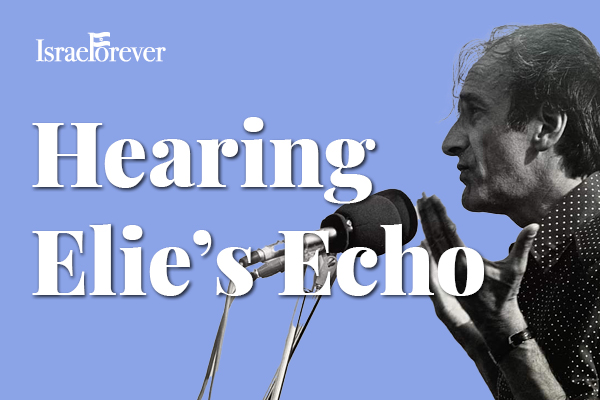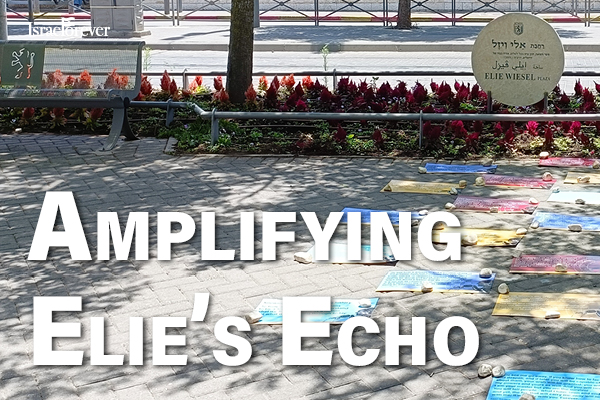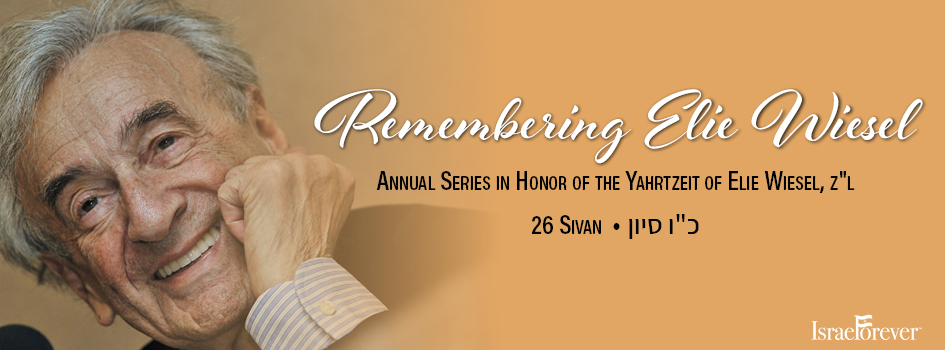Elie Wiesel Book List

Elie Wiesel was an activist, a visionary, a voice for humanity, a teacher. But he was also a prolific author, whose writing career spanned over 50 years and covered numerous genres. Elie was an unknown writer for many years, and wrote 65 books by the time of his passing at the age of 87. Each one tells a different story from a different angle of Jewish experience.How many of Elie Wiesel’s books have you read?
NOTE: All book synopses have been adapted from Amazon.
1960s
- The Night Trilogy
- Night (1960)
[MEMOIR]
Night is Elie Wiesel's masterpiece, a candid, horrific, and deeply poignant autobiographical account of his survival as a teenager in the Nazi death camps. - Dawn (1961)
[FICTION]
Fictional sequel to Night. Dawn tells the story of Elisha, a young Jewish man, a Holocaust survivor, and an Israeli freedom fighter in British-controlled Palestine. Dawn presents a haunting glimpse into the soul of one man and a budding nation. - Day (1962)
[FICTION]
Torn between choosing life or death, Day again and again returns to the guiding questions that inform Wiesel's trilogy: the meaning and worth of surviving the annihilation of a race, the effects of the Holocaust upon the modern character of the Jewish people, and the loss of one's religious faith in the face of mass murder and human extermination.
- Night (1960)
The Town Beyond the Wall (1964)
[FICTION]
Michael—a young man in his thirties, a concentration camp survivor—makes the difficult trip behind the Iron Curtain to the town of his birth in Hungary.- The Gates of the Forest (1964)
[FICTION]
Gregor—a teenaged boy, the lone survivor of his family—is hiding from the Germans in the forest. He hides in a cave, where he meets a mysterious stranger who saves his life. The Jews Of Silence (1966)
[MEMOIR]
In the fall of 1965, the Israeli newspaper Haaretz sent a young journalist named Elie Wiesel to the Soviet Union to report on the lives of Jews trapped behind the Iron Curtain.- Legends of Our Time (1968)
[MEMOIR/ANTHOLOGY]
Elie Wiesel had haunting, often surreal encounters with a wide range of people—sages, mystics, teachers, and dreamers. In Legends of Our Time, he shares with us some of their stories.
1970s
- A Beggar In Jerusalem (1970)
[FICTION]
In the days following the Six-Day War, a survivor of the Holocaust visits the reunited city of Jerusalem. At the Western Wall in the Old City, he encounters the beggars and madmen that congregate there every evening - and who force him to confront the ghosts of his past and his ties to the present. - One Generation After (1970)
[MEMOIR]
Twenty years after he and his family were deported from Sighet to Auschwitz, Elie Wiesel returned to his town in search of the watch—a bar mitzvah gift—he had buried in his backyard before they left. - Souls on Fire (1972)
[ANTHOLOGY]
Souls on Fire is not a simple chronological history of Hasidism, nor is it a comprehensive book on its subject. Elie Wiesel has captured the essence of Hasidism through tales, legends, parables, sayings, and deeply personal reflections. - The Oath (1972)
[FICTION]
When a Christian boy disappears in a fictional Eastern European town in the 1920s, the local Jews are quickly accused of ritual murder. - Messengers of God (1976)
[ANTHOLOGY]
Elie Wiesel’s classic look at Job and seven other Biblical characters as they grapple with their relationship with God and the question of his justice. - A Jew Today (1978)
[ANTHOLOGY]
In this powerful and wide-ranging collection of essays, letters and diary entries, weaving together all the periods of the author's life -- from his childhood in Transylvania to Auschwitz and Buchenwald, Paris and New York. - The Trial of God (1979)
[FICTION - PLAY]
Set in a Ukranian village in the year 1649, this haunting play takes place in the aftermath of a pogrom.
1980s
- The Testament (1980)
[FICTION]
On August 12, 1952, Russia's greatest Jewish writers were secretly executed by Stalin. In this remarkable blend of history and imagination, Paltiel Kossover meets the same fate but, unlike his real-life counterparts, he is permitted to leave a written testament. - Five Biblical Portraits (1981)
[ANTHOLOGY]
A sequel to Elie Weisel's Messengers of God; in this work Wiesel enhances his well-known skill in bringing ancient religious figures to literary life with his stories of Joshua, Elijah, Saul, Jeremiah, and Jonah. - Somewhere A Master (1982)
[ANTHOLOGY]
The compassion of Reb Moshe-Leib, the vision of the Seer of Lublin, the wisdom of Reb Pinhas, the warmth of the Ba’al Shem Tov, the humor of Reb Naphtali–to their followers these sages appeared as kings, judges, and prophets. It is Elie Wiesel’s unique gift to make the lives and tales of these great teachers as compelling now as they were in a different time and place. - The Golem (1983)
[FICTION]
Elie Wiesel has collected legends associated with this enigmatic and elusive figure, and retold them as seen through the eyes of a wizened gravedigger who claims to have witnessed as a child the numerous miracles that legend attributes to the Golem. - The Fifth Son (1983)
[FICTION]
Reuven Tamiroff, a Holocaust survivor, has never been able to speak about his past to his son, a young man who yearns to understand his father’s silence. Haunting, poetic, and very contemporary, The Fifth Son builds to an unforgettable climax as the son sets out to complete his father’s act of revenge. - Against Silence (1985)
[ANTHOLOGY]
Three-volume collection of essays, speeches, and articles written by Elie Wiesel. - Twilight (1987)
[FICTION]
Raphael Lipkin is a man obsessed. He hears voices. He talks to ghosts. He is spending the summer at the Mountain Clinic, a psychiatric hospital in upstate New York—not as a patient, but as a visiting professional with a secret, personal quest.
1990s
- From the Kingdom of Memory (1990)
[ANTHOLOGY]
Elie Wiesel weaves together reminiscences of his life before the Holocaust, his struggle to find meaning afterward, and the actions he has taken on behalf of others that have defined him as a leading advocate of humanity and have earned him the Nobel Peace Prize. - Sages and Dreamers (1991)
[ANTHOLOGY]
Twenty-five portraits of figures from the Jewish tradition explore the mysteries of Jewish existence and themes of humility, silence, loyalty, and truth, and feature Esther, Noah, Daniel, Ruth, and others. - The Forgotten (1992)
[FICTION]
Distinguished psychotherapist and survivor Elhanan Rosenbaum is losing his memory to an incurable disease. Never having spoken of the war years before, he resolves to tell his son about his past—the heroic parts as well as the parts that fill him with shame—before it is too late. - All Rivers Run to The Sea (1994)
[MEMOIR]
In this first volume of his two-volume autobiography, Wiesel takes us from his childhood memories of a traditional and loving Jewish family in the Romanian village of Sighet through the horrors of Auschwitz and Buchenwald and the years of spiritual struggle, to his emergence as a witness for the Holocaust's martyrs and survivors and for the State of Israel, and as a spokesman for humanity. - Memoir in Two Voices (1996)
[MEMOIR]
The late French president and the Nobel Prize-winning author present a joint memoir that touches upon a wide variety of subjects, from literature and memory to power and politics. - The Judges (1999)
[FICTION]
A plane en route from New York to Tel Aviv is forced down by bad weather. A nearby house provides refuge for five of its passengers. Their host begins to interrogate them. Soon he announces that one of them, the least worthy, will die. The Judges is a powerful novel that reflects the philosophical, religious, and moral questions that are at the heart of Elie Wiesel’s work.
2000s
- After The Darkness (2002)
[NON-FICTION]
As the last generation of survivors is passing and a new generation must be introduced to mankind’s darkest hour, Wiesel sums up the most important aspects of Hitler’s years in power and provides a fitting memorial to those who suffered and perished. - Conversations with Elie Wiesel (2003)
[NON-FICTION]
A far-ranging dialogue with the Nobel Peace Prize-winner on the major issues of our time and on life’s timeless questions. - Wise Men and Their Tales (2003)
[ANTHOLOGY]
A master teacher gives us his fascinating insights into the lives of a wide range of biblical figures, Talmudic scholars, and Hasidic rabbis. - The Sonderberg Case (2008)
[FICTION]
Despite personal success, Yedidyah—a theater critic in New York City, husband to a stage actress, father to two sons—finds himself increasingly drawn to the past. From the Nobel laureate and author of the masterly Night, a deeply felt, beautifully written novel of morality, guilt, and innocence. - A Mad Desire to Dance (2009)
[FICTION]
A European expatriate living in New York, Doriel suffers from a profound sense of desperation and loss. His mother, a member of the Resistance, survived World War II only to die soon after in France in an accident, together with his father. Surrounded by ghosts, spurred on by demons, Doriel finally turns to Dr. Thérèse Goldschmidt, a psychoanalyst who finds herself particularly intrigued by her patient. - Rashi (2009)
[NON-FICTION]
From Elie Wiesel comes a magical book that introduces us to the towering figure of Rashi—Rabbi Shlomo Yitzchaki—the great biblical and Talmudic commentator of the Middle Ages. Wiesel brilliantly evokes the world of medieval European Jewry, a world of profound scholars and closed communities ravaged by outbursts of anti-Semitism and decimated by the Crusades.
2010s
- Hostage (2010)
[FICTION]
A charged, deeply moving novel about the legacy of the Holocaust in today’s troubled world and the ongoing Israeli-Palestinian conflict, - Open Heart (2011)
[MEMOIR]
A profoundly and unexpectedly intimate, deeply affecting summing up of life so far, from one of the most cherished moral voices of our time.




